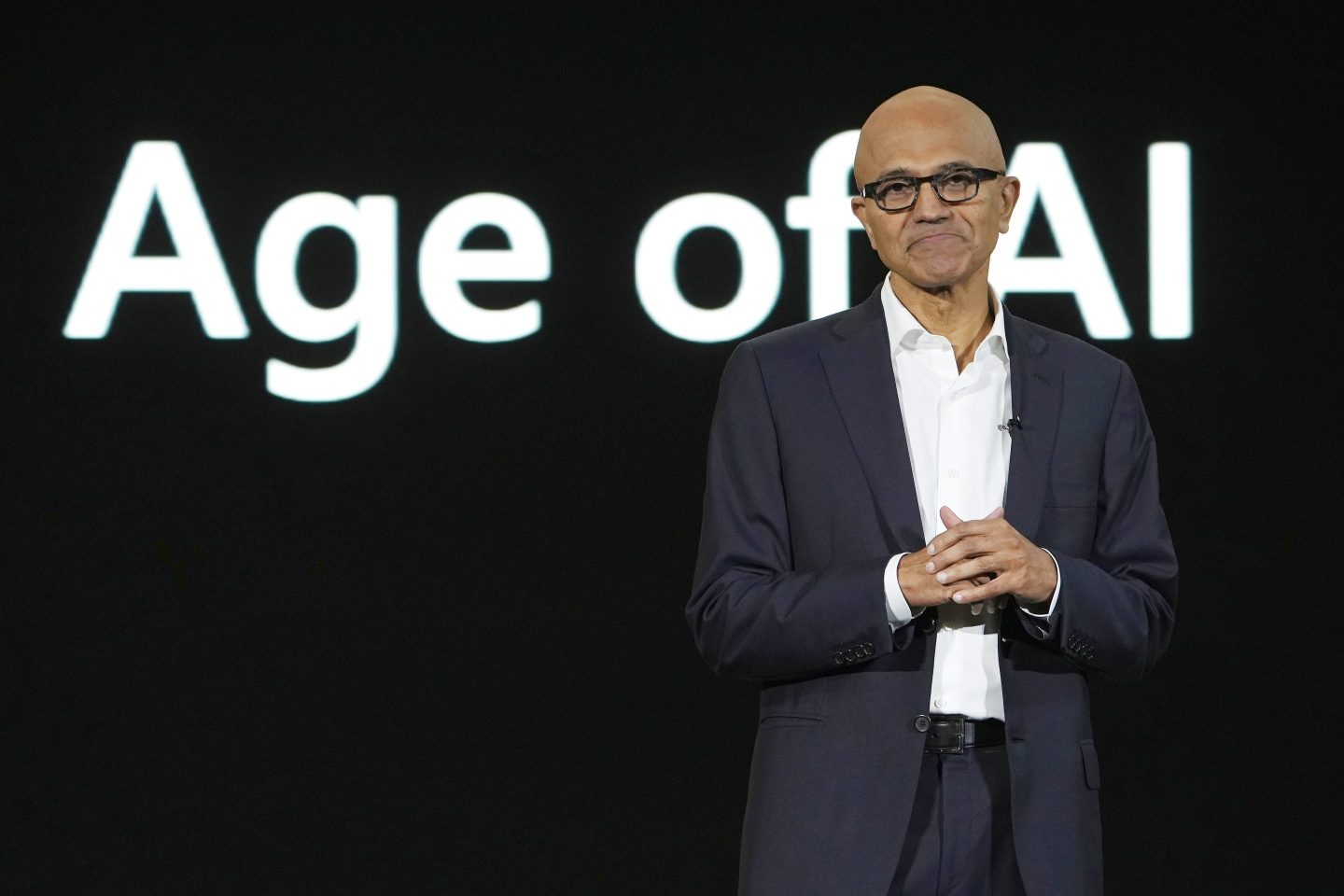Good morning.
In his decade as CEO of Microsoft, Satya Nadella has transformed a troubled tech giant into the world’s most valuable company, with a market cap of more than $3.1 trillion. In his 32 years at Microsoft, though, Nadella has lived through four major technology platform shifts—from PCs to the web, mobile, cloud computing and now AI—and he knows how the company struggled to compete after some of them. That may explain the air of urgency and mild paranoia that Nadella projects in Fortune’s latest cover story on Nadella by my colleague Jeremy Kahn.
As Nadella told Jeremy: “When the paradigm shifts, do you have something to contribute? Because there is no God-given right to exist if you don’t have anything relevant.”
With Microsoft’s partnership and $13 billion-plus investment in OpenAI, Nadella has given the tech giant a clear lead in the AI era. (The Microsoft Build developer conference kicks off tomorrow and is likely to feature several significant AI-fueled upgrades.) As Jeremy points out in his article, the company’s ties to OpenAI also come with risk, as we saw when OpenAI’s board fired—and then begrudgingly rehired—CEO Sam Altman last year. The recent departure of OpenAI researchers Ilya Sutskever and Jan Leike also sparked concern since it led to the dissolution of a team focused on the safety of hypothetical future AI systems that would be more capable than any human. And plenty of rivals are rushing in to compete.
No one is more aware of the risks than Nadella. He lived through the Microsoft antitrust case in the late 1990s that forced the company to open up its Windows operating system to competition after it was found guilty of trying to monopolize the browser market. That experience may have factored into the company’s recent decision to unbundle its Teams videoconference app from its Office software (though the still-looming threat of EU antitrust action was likely a bigger impetus). He saw Microsoft make failed bets on media players, cell phones, tablets and other technologies. He notices when customers give a piece of their business, however small, to a rival.
But Nadella is perhaps most sensitive to public scrutiny, telling Jeremy that what keeps him up at night is the possibility that his company might lose “its license to operate”—the one that relies on maintaining public trust by being a force for good in the communities in which it operates. Maintaining that license means investing in local economies, as he recently demonstrated with several announcements in Asia. It means figuring out how to meet Microsoft’s 2030 goals to become carbon negative when its AI push has sent CO2 emissions up 30% since 2020. And throughout his tenure, it has meant trying to create and sustain a culture that’s humble, hungry and ready to grow. Check out Jeremy’s story here.
More news below.
Diane Brady
diane.brady@fortune.com
Follow on LinkedIn
TOP NEWS
Musk’s loss is others’ gain
Tesla CEO Elon Musk’s shock decision to lay off the entire team responsible for the company’s “Supercharger” system means the rest of the industry gets to snap up experienced and passionate workers. It’s the “single greatest talent acquisition opportunity in the industry,” says the founder of one EV infrastructure company. Musk may be realizing his mistake: He is reportedly rehiring some of the workers he laid off. Fortune
‘Quantum Valley’
Nvidia cofounder Curtis Priem is donating $75 million to Rensselaer Polytechnic University so it can buy an IBM-manufactured quantum computer. The Troy, N.Y.-based school will be the first university anywhere in the world to have such a device. Priem hopes the investment will supercharge tech investment in the area, turning the Hudson Valley into “Quantum Valley.” The Wall Street Journal
Is China’s rescue package big enough?
On Friday, Beijing unveiled a $42 billion scheme to rescue the country’s slumping real estate sector, yet analysts worry the unprecedented measures still don’t go far enough. “Any game-changing housing easing measures…would likely require significantly more funding,” Goldman Sachs economists wrote, citing previous estimates that $1.1 trillion may be needed to get the sector back on track. Bloomberg
AROUND THE WATERCOOLER
American stock markets have dominated global trading for most of the last 120 years. Here’s how other big economies measure up by Nicolas Rapp and Matt Heimer
Gen Z and millennials are trying to save the planet (and ease their climate anxiety) by quitting jobs that aren’t eco-friendly by Orianna Rosa Royle
The rise of the English major: BlackRock COO wants to recruit liberal arts analysts that ‘have nothing to do with finance or technology’ by Chloe Berger
Why can’t America have high speed rail? Because our investment is a ‘rounding error’ compared with Europe’s, says Amtrak’s CEO by Paolo Confino
Commentary: Corporate America is mobilizing to support democracy in 2024 and beyond. Here’s how by Ryan Gellert and Greg Behrman
This edition of CEO Daily was curated by Nicholas Gordon.














